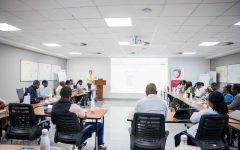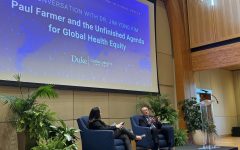Q&A with Dean Abebe Bekele
September 17, 2018 2018-09-17 16:19Q&A with Dean Abebe Bekele
Abebe Bekele, MD, FCS, former Dean of the School of Medicine at Addis Ababa University and CEO of Tikur Anbessa Hospital, has been appointed the University’s founding Dean of Health Sciences. Professor Bekele is a well-known and highly regarded cardiothoracic and general surgeon, university professor, researcher, leader, and an advocate of Global Safe Surgery and Anesthesia. We sat down with Dean Bekele to discuss his motivations for pursuing medicine, the global health challenges he hopes to tackle, and his vision for UGHE’s future.
Q: What are some of the earliest experiences that drew you to a career in medicine and why did you choose surgery as the focus of your clinical work? In what ways do you hope to impact the field through academic leadership?
A: I must be honest here, when I was young, I had no idea what being a doctor actually meant. I merely hoped to wear a white coat and be called “Doctor.” My older siblings went forward with medical school and as my most immediate role models, they showed me the way. Though I joined for those reasons, I very quickly realized that I actually loved medicine and wanted to learn as much as I could about treating patients. If given the opportunity, I would choose medicine again.
I joined surgery for two reasons: One, I had amazing teachers that were young surgeons and they made my attachment to the department fun. Two, I appreciated that in surgery I could have a direct and immediate impact on someone’s health. When I finished my residency in general surgery in 2007, there were only two cardiothoracic surgeons in Ethiopia (both foreign-trained and senior). This deficit inspired me to sub-specialize in cardiothoracic surgery and engage in academic leadership opportunities. I noticed there were so few senior professionals and no readily available replacements and I wanted to continue passing on impactful knowledge.
I have spent the past six years in academic leadership while maintaining my active clinical practice. While serving as Dean and CEO of a hospital, I continued to see and operate on my patients and intend to do the same at UGHE. I hope to teach classes and practice surgery while leading the University. I am aware that Rwanda has a significant shortage of thoracic surgeons and I want to play a part in training the next generation of specialists.
Q: What does “health equity” mean to you and how do you envision this concept in action?
A: It is my strong belief that if you want to learn medicine and become a doctor, it should not matter where you are from, whether you are male or female, whether you have family connections, whether you went to a private school, or whether you grew up with no money. The opportunity to learn should be made available for everyone if the will and aptitude to study medicine is there. “Health equity” means that no one should be denied a critical life-saving service because of their inability to afford health care. The opportunity to receive quality education and health services should be available to everyone. Who you are should not matter; what should matter is what you are willing to do with your brain, your hand, and your heart.
For our new MBBS/MGHD program we are recruiting high school graduates with backgrounds in biology, chemistry, physics, and mathematics that have passing marks on the national examinations. We’re making equity the focus of our search and are going to be announcing application openings everywhere: schools, refugee camps, online, on the radio, in Rwanda and beyond. We want to make sure everyone hears about it and has the opportunity to choose to apply.
Q: What are you most excited about in your new role as founding Dean of UGHE? What are some of the global health delivery challenges that you hope to impact?
A: I’m excited at the prospect of building from the ground up. We have the unique opportunity to design a school the way we want from the very start with a strong focus on equity and diversity; I’m energized by that. We are designing a medical school that follows the principles of community-based education while integrating hands-on, intensive hospital learning, lab work, and simulation work. I believe that by producing new doctors for Rwanda and the region, we will be able to reach underserved people and improve quality of care.
In regards to global health delivery challenges, I hope to have an impact on surgery and emergency care. Emergency care accounts for 70% of all hospital visits in the region, so our graduates must have strong competency in that area. With surgery, there is a misconception that any surgical procedure is expensive, must require specialty investment and human resources, and is only reserved for those who can afford it. I hope to change that perception of the practice of surgical care and advocate for “Safe Surgical, Anesthesia and Obstetric care for all.”
Additionally, I am pleased that our campus will located be in Butaro, providing services for the underserved, rural community.
Q: Why is it important for students to not only train as doctors under the MBBS program, but to also complete their Master of Science in Global Health Delivery (MGHD)? What is the advantage of the dual degree program?
A: The days where doctors are expected to just treat patients are long gone. We as physicians have to connect with and understand the communities that we serve and live in. We have to know what their day-to-day is like. While prevention of diseases should be our main target, so many of the issues our patients face are a result of social determinants of health. We as doctors need to understand this.
Health care is becoming increasingly global. Our long term vision is to see our graduates play a pivotal role in the transformation of health care delivery across the African continent and beyond and we hope that the education we are providing will prepare them for this role. We are committed, not just to training doctors, but to training health care leaders around the world. I would not be surprised if, 10-15 years in the future, we see our graduates positioned as leaders of a country’s health system, including as Ministers of Health and Medical Directors.
Q: What is your overall vision for UGHE?
A: To become a global health university that stands for equity, diversity, innovative education and research, and strong community service. The structures and programs are in place to expand and grow the potential of UGHE in the years to come and I am excited to play a role in guiding the next generation of global health leaders.







